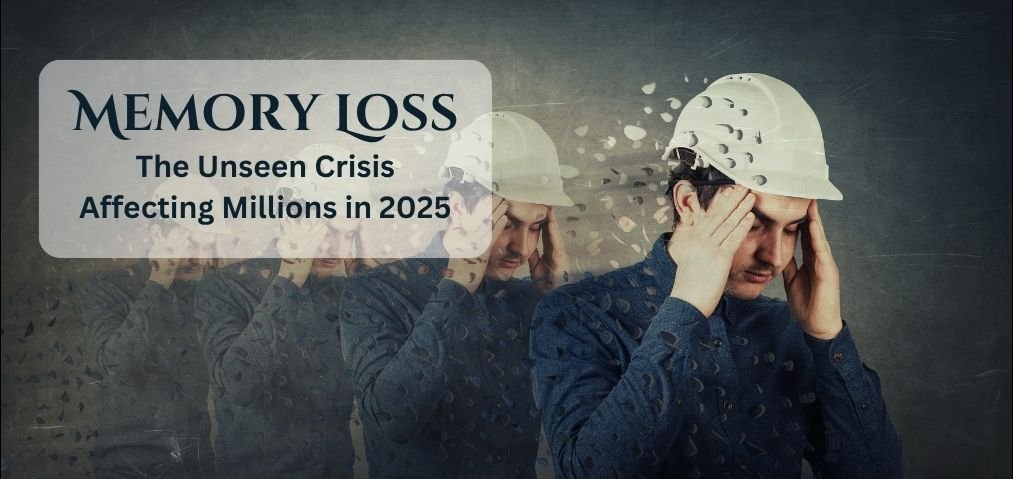Memory Loss is no longer a sign of aging itself—it has become a growing problem among people of all age groups in 2025. With our contemporary way of life, greater dependence on electronic media, and rising levels of stress, mental decline is no longer a far-off threat, but a daily reality. Whether creeping in insidiously with missed appointments or more precipitously as confusion in familiar environments, memory loss has the tendency to creep into our lives quietly, until it is too late.
This post looks at the causes, effects, and prevention strategies of memory loss from a perspective on the challenges of the age. While the world is speeding ahead in technology and manufacture, our minds might well be sliding silently behind.
Learning from Memory Loss: Something More Than Forgetfulness
Most people assume memory loss to be mere forgetfulness, but the case is more complex. It’s a neurological condition with diverse etiology—anything from physical trauma and mental illnesses to chronic diseases like Alzheimer’s and dementia. Nowadays, a horrifying figure of young adults fight short-term memory problems, indicating a general trend towards premature cognitive deterioration.
Early warning signs of memory loss are:
- Often misplacing things
- Forgetting new information
- Struggling to keep up with a conversation
- Asking the same questions or telling the same stories within minutes
All too often, ignoring such symptoms results in late diagnosis, robbing individuals of proper procedure intervention.
Causes of Memory Loss in the Modern Era
With the age of electronics dominating our existence, memory loss has found new accelerators. The following are the reasons which have accelerated the condition in recent years:
- Technology Overload
Prolonged screen usage, access to information instantly, and multitasking have weakend the memory power of our brain in remembering and processing long-term memories. The more dependent we are on digital reminders and alerts, the more watered down we become with our own remembering system. - Chronic Stress and Anxiety
Today’s levels of stress have never been higher. When cortisol, the stress hormone, is elevated in the long term, it impacts the hippocampus, the brain’s chief memory hub. That is a major cause of short-term memory loss. - Lack of Sleep
Sleep strengthens memory. Poor quality or quantity sleep pervades neural pathways, causing forgetfulness and confusion. - Poor Diet and Lifestyle
A diet rich in empty calories and sugar and lacking in nutrients combined with physical inactivity may cause brain inflammation and inadequate blood supply to the brain, thus exacerbating memory loss.
The Emotional Consequences of Memory Loss
In addition to intellectual impairment, memory loss also has a significant impact on one’s emotional state. Patients describe feeling as though they are disconnected from themselves. They feel embarrassed, anxious, and withdrawn, particularly when simple tasks in the everyday world seem overwhelming.
Families are also affected—balancing the terror of watching a loved one gradually erase their identity. This hidden burden will often go unspoken, fostering an epidemic of caregiver stress behind closed doors.
Types of Memory Loss: Know the Difference
Not all memory loss is created equal. Understanding its type can lead to more effective treatments and coping strategies.
- Short-Term Memory Loss: Trouble recalling what happened recently or knowledge learned recently.
- Long-Term Memory Loss: Trouble remembering what occurred previously.
- Transient Global Amnesia: Sudden, temporary memory loss due to stress or trauma.
- Progressive Memory Loss: Accompanied by neurodegenerative diseases such as Alzheimer’s disease.
Determining the root cause is essential in designing an effective medical or lifestyle intervention.
Early Detection and Diagnosis: Why It Matters
Early detection of memory loss can significantly enhance the quality of life. Medical assessments often involve cognitive assessment, lab testing, MRI or CT scan, and psychological assessment. Active intervention can reverse or halt the development of symptoms.
Family members need to monitor behavior, memory, or language changes and seek medical attention. Prevention begins with a state of awareness.
Taking Care of and Preventing Memory Loss Naturally
There is no pill to magically correct memory loss, but you can meaningfully limit its effects with preventive lifestyle modification:
- Intellectual Exercise
Puzzles, reading novels, language courses, and memory games may keep the mind in trim and attentive. - Physical Exercise
Aerobic exercise on a regular basis enhances blood flow to the brain and stimulates new neuron growth. - Diet
Omega-3 fatty acids, antioxidants, and vitamins such as B12-rich diet plays the biggest role in maintaining memory. - Meditation and Mindfulness
Practice of mindfulness on a daily basis enhances brain function and structure, stress reduction, and memory improvement. - Digital Detox
Restriction of screen time and decrease in multitasking can assist the brain in regaining its concentration and memory ability.
Treatment Options for Severe Memory Loss
When lifestyle modifications are not sufficient, medical treatment is necessary. Some of the most widely used treatments are:
- Cholinesterase inhibitors for Alzheimer-type memory loss
- Therapy and Counseling for memory problems caused by stress
- Cognitive Behavioral Therapy (CBT) to focus on coping skills
- Neurofeedback Training to enhance brainwave patterns
Memory disorders cannot be cured with medications, but they can decrease symptoms and enhance functioning in day-to-day life.
The Future of Brain Health and Memory Loss Research
Neuroscience breakthroughs, AI diagnosis, and gene therapy are giving hope. In 2025, smart wearables and memory-augmenting apps are being designed to identify early warning signs of brain decline. Brain-computer interface (BCI) research is also attempting to “upload” memory triggers for the digitally enhanced human brain.
But regardless of how much technology can accomplish, natural brain well-being must be the highest priority.
Final Thoughts: A Call for Awareness
Loss of memory is never to be reduced to simply a consequence of aging. It is a public and social disease that requires attention from the collective conscience, preventative action, and humane care. In a world where ours is now one of constant and unforgiving speedup, slowing down and nourishing our brains may well be the most subversive thing one can do.
Alter your lifestyle today. Identify warning signs early. Take good care of people who are suffering. Because in the fight against memory loss, awareness is the very first and best step.





